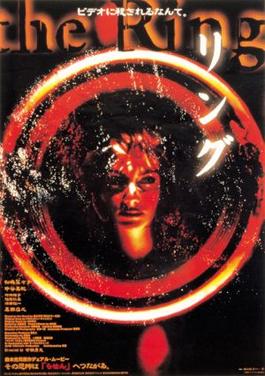
Ring is a 1998 Japanese supernatural psychological horror film directed by Hideo Nakata, based on the 1991 novel by Koji Suzuki. The film stars Nanako Matsushima, Miki Nakatani and Hiroyuki Sanada, and follows a reporter who is racing to investigate the mystery behind a cursed video tape; whoever watches the tape dies seven days after doing so. The film is titled The Ring in English in Japan and released as Ringu in North America.

Exorcist II: The Heretic is a 1977 American supernatural horror film directed by John Boorman and written by William Goodhart. It is the second installment in The Exorcist film series and the sequel to The Exorcist (1973), and stars Linda Blair, Richard Burton, Louise Fletcher, Max von Sydow, Kitty Winn, Paul Henreid, and James Earl Jones. It was the last film to feature veteran actor Paul Henreid. Set four years after the previous film, the film centers on the now 16-year-old Regan MacNeil, who is still recovering from her previous demonic possession.
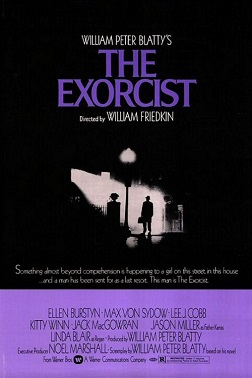
The Exorcist is a 1973 American supernatural horror film directed by William Friedkin from a screenplay by William Peter Blatty, based on his 1971 novel. The film stars Ellen Burstyn, Max von Sydow, Jason Miller, and Linda Blair, and follows the demonic possession of a young girl and her mother's attempt to rescue her through an exorcism by two Catholic priests.

Eyes of Laura Mars is a 1978 American neo-noir supernatural horror thriller film directed by Irvin Kershner and starring Faye Dunaway, Tommy Lee Jones, Brad Dourif, René Auberjonois, and Raul Julia. It follows a New York City fashion photographer (Dunaway) who suddenly develops the clairvoyant ability to witness disturbing serial murders from the point of view of the killer. The screenplay was adapted from a spec script titled Eyes, written by John Carpenter; it was Carpenter's first major studio film. H. B. Gilmour later wrote a novelization.

Occult detective fiction is a subgenre of detective fiction that combines the tropes of the main genre with those of supernatural, fantasy and/or horror fiction. Unlike the traditional detective who investigates murder and other common crimes, the occult detective is employed in cases involving ghosts, demons, curses, magic, vampires, undead, monsters and other supernatural elements. Some occult detectives are portrayed as being psychic or in possession of other paranormal or magical powers.

The Fury is a 1978 American supernatural horror thriller film directed by Brian De Palma and starring Kirk Douglas, John Cassavetes, Amy Irving, Carrie Snodgress, Charles Durning, and Andrew Stevens. The screenplay by John Farris was based on his 1976 novel of the same name.

Incubus is a 1982 Canadian supernatural slasher film directed by John Hough and written by George Franklin, based on the 1976 novel of the same name by Ray Russell. It stars John Cassavetes, Kerrie Keane, and John Ireland. The plot focuses on a small Wisconsin town where a mysterious figure is raping and murdering young women. Its title is sometimes extended to The Incubus.

The Amityville Horror is a 1979 American supernatural horror film directed by Stuart Rosenberg, and starring James Brolin, Margot Kidder, and Rod Steiger. The film follows a young couple who purchase a home haunted by combative supernatural forces. It is based on Jay Anson's 1977 book of the same name, which documented the alleged paranormal experiences of the Lutz family who briefly resided in the Amityville, New York home where Ronald DeFeo Jr. committed the mass murder of his family in 1974. It is the first entry in the long-running Amityville Horror film series, and was remade in 2005.
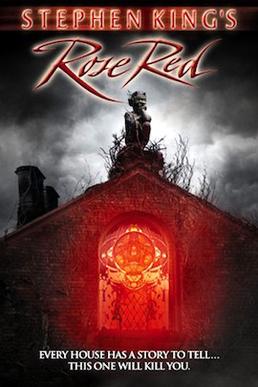
Rose Red is a 2002 American television miniseries scripted by horror novelist Stephen King, directed by Craig R. Baxley, and starring Nancy Travis, Matt Keeslar, Julian Sands, Kimberly J. Brown, David Dukes, Melanie Lynskey, Matt Ross, Emily Deschanel, Judith Ivey, and Kevin Tighe. It was filmed in Lakewood, Washington. The plot focuses on a reputedly haunted mansion located in Seattle, Washington, named Rose Red. Due to its long history of supernatural events and unexplained tragedies, the house is investigated by parapsychologist Dr. Joyce Reardon and a team of gifted psychics.
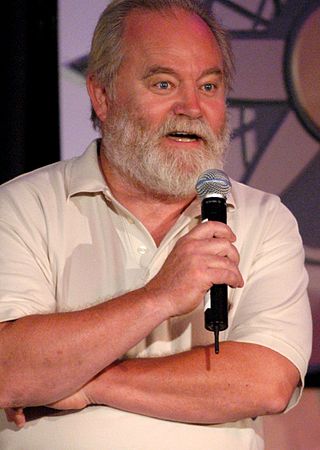
Alan John Scarfe is a British–Canadian actor, stage director and author. He is a former Associate Director of the Stratford Festival (1976–77) and the Everyman Theatre in Liverpool (1967–68). He won the 1985 Genie Award for Best Performance by an Actor in a Supporting Role for his role in The Bay Boy and earned two other Genie best actor nominations for Deserters (1984) and Overnight (1986) and a Gemini Award nomination for best actor in aka Albert Walker (2003). He won a Jessie Award for best actor in 2005 for his performance in Trying at the Vancouver Playhouse. In 2006 he won the Jury Prize for best supporting actor at the Austin Fantastic Fest in The Hamster Cage and the Vancouver Film Critics Circle honorary award for lifetime achievement.

The Amityville Curse is a 1990 Canadian supernatural horror film directed by Tom Berry and starring Kim Coates, Cassandra Gava and Jan Rubeš. It is loosely based on the novel of the same name by Hans Holzer. It is the fifth film in the Amityville Horror film series.

Beyond the Door is a 1974 supernatural horror film directed by Ovidio G. Assonitis and Roberto Piazzoli, and starring Juliet Mills, Gabriele Lavia, and Richard Johnson. The plot follows a San Francisco housewife who becomes demonically possessed in the midst of a pregnancy. The film was a co-production between the United States and Italy. It was released in the United Kingdom in an extended cut under the title Devil Within Her.
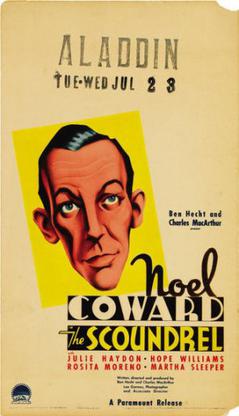
The Scoundrel is a 1935 American drama film directed by Ben Hecht and Charles MacArthur, and starring Noël Coward, Julie Haydon, Stanley Ridges, Rosita Moreno and Lionel Stander. It was Coward's film debut, aside from a bit role in a silent film. It deals with supernatural redemption in a way rather similar to Ferenc Molnár's Liliom, and drew inspiration from the life of publisher Horace Liveright, who had died in September 1933.

The Kiss is a 1988 supernatural horror film directed by Pen Densham and starring Joanna Pacula and Meredith Salenger. The plot follows two young women who find themselves haunted by an ancient parasitic curse that was passed on to one of them by a kiss.

Full Circle, released in the United States as The Haunting of Julia, is a 1977 supernatural horror film directed by Richard Loncraine, and starring Mia Farrow and Keir Dullea. Based on the novel Julia by the American writer Peter Straub, it is the first film realization of one of his books, and follows a woman who, after the death of her daughter, finds herself haunted by the vengeful ghost of a young girl in her new home.
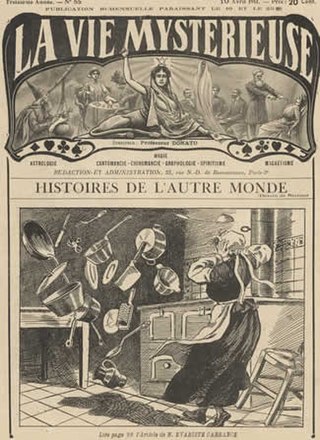
Telekinesis is a hypothetical psychic ability allowing an individual to influence a physical system without physical interaction. Experiments to prove the existence of telekinesis have historically been criticized for lack of proper controls and repeatability. There is no reliable evidence that telekinesis is a real phenomenon, and the topic is generally regarded as pseudoscience.

Boardinghouse is a 1982 American supernatural slasher film directed, written by, and starring musician John Wintergate. Its plot follows a group of aspiring actresses and models who begin to die mysteriously in a Los Angeles boarding house, which was once the site of a series of bizarre deaths. It carries the distinction of being the first horror film to be shot-on-video.

The Exorcist is an American horror media franchise that originated with William Peter Blatty's 1971 horror novel of the same name and most prominently featured in a 1973 film adaptation of the novel, and many subsequent prequels and sequels. All of these installments focus on fictional accounts of people possessed by Pazuzu, the main antagonist of the series, and the efforts of religious authorities to counter this possession.

The Antichrist, also released as The Tempter, is a 1974 Italian supernatural horror film directed by Alberto De Martino and starring Carla Gravina, Mel Ferrer, Arthur Kennedy, Umberto Orsini, Alida Valli, Remo Girone, Anita Strindberg, and George Coulouris. The musical score was composed by Ennio Morricone and Bruno Nicolai. It is widely regarded as a cash-in on The Exorcist, a similarly-themed and widely-successful American film released the previous year. It is considered a cult film.
Corinne Alexandra Conley is an American actress who spent the majority of her career in Canada, notable for having won the Canadian Council of Authors and Artists' Best Actress Award. Conley is known for her voiceover work in various films and television productions and is better recognized for voicing Rudolph's mother and presumably Dolly for Sue in Rudolph the Red-Nosed Reindeer (1964).


















